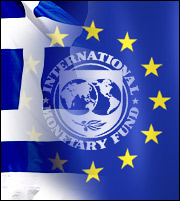By By: Kiran Moodley | Assistant Producer, CNBC
In a rare piece of good news for Greece, euro zone officials approved the transfer of 4 billion euros ($5.3 billion) of funding on Friday, leading analysts to claim that – although there is a tough road ahead – the worst is over for the embattled country.
European governments are expected to approve the latest aid disbursement on Monday, meaning that, despite delays, Greece has once again managed to meet its bailout requirements.
David Lea, senior analyst at Control Risks, said this was another sign things were starting to look up for Greece, which has been struggling with recession for the past six years.
"Greece has been producing slightly better data (substantially better in terms of areas like primary balance and collection of tax revenues) since mid-2012, and this data now appears to be hitting home on an official level," he told CNBC on Friday.
"The rather premature obsession with the 'Grecovery' buzzword at the end of last year and start of this has given way to a more realistic and pragmatic response to the situation."
(Read More: Greece gets green light for 4 billion euro payment)
The political situation in the country has also improved in recent weeks, after a wobbly period for Prime Minister Antonis Samaras in June. The Democratic Left party (DIMAR) party left the coalition government after talks to resume the state broadcaster, ERT, collapsed.
But Samaras managed to stay in power and his government is more stable because of it, Lea added. "There have been no real major protests that have turned violent for more than a year now, and the government looks like remaining relatively stable now that the Democratic Left have pulled out."
Nicolaus Heinen, an economist at Deutsche Bank, said he saw progress in Greece, as fiscal deficits have been lowered and a liberalized labor market has decreased labor unit costs. But he stressed that meeting the requirements dictated by the "troika" of the European Commission, the European Central Bank and the International Monetary Fund did not mean progress was actually occurring.
"The troika's requirements can only address the regulatory conditions that can lead to results with a time lag – but not the results themselves," Heinen told CNBC. "Thus, Greece complying with the requirements of the troika does not mean that conditions themselves will improve the business case of Greece soon."
(Read More: Greece minister: Failure to meet bailout terms not our fault)
Grant Lewis, head of research at Daiwa Capital Markets, said the latest approval of funding simply showed that Greece was following the rules.
"They have no choice. It's that simple. In terms of what they're doing right, they're not doing anything wrong," he told CNBC.
But the real issue for Greece, according to Lewis, was not this instalment but rather the issue of unsustainable debt going forward.
"There is an issue further down the line that Greece's debt looks unsustainable anyway, and another package would be required, with some restructuring…Greece will comeback to become an issue either later this year or early next year."
(Read More: Has Super Mario succeeded in saving Europe?)
Greece's debt is a hot topic, with the country's former deputy finance minister Petros Doukas telling CNBC earlier this month that the country needs a "sizable haircut" of 40 percent on its current debts. His comments came after German finance minister Wolfgang Schaeuble told the country to stop lobbying for any aid restructuring this year.
Greece's debt-to-GDP ratio stood at 156.9 percent at the end of 2012, but the issue is unlikely to be addressed until after the German elections in September, as any talk of writing-off Greek debt would be hugely unpopular with the German electorate.
Megan Greene, chief economist at Maverick Intelligence, highlighted that Greece had finally addressed the size and inefficiency of its public sector ("albeit three years too late"), but said there are still problems ahead.
"At the top of the list of what is going well is Greece's fiscal adjustment, which despite tax revenue collection still lagging targets is on track," she told CNBC. "Greece should be in primary surplus this year (not adjusted for arrears)."
But she added: "tax collection remains a problem, the privatisations haven't gone well, and the business operating environment remains extremely challenging."
Yet despite the challenges, Control Risks' Lea said Friday's funding approval showed the worst was over for Greece – at least for now.
"The constant threat of pulling the plug has receded for now, and that's helped everyone breathe a little bit easier," he said.



















